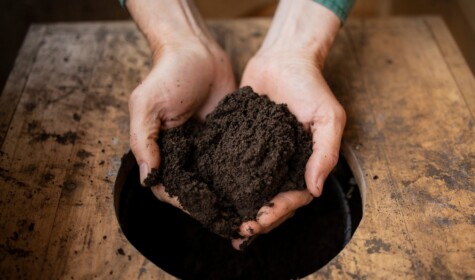Global soils have deteriorated at an alarming rate. It’s estimated that a third of the Earth’s soils are in some way degraded, and that we are on course for this rising to 90% by 2050. The fewer micronutrients in this poorer soil, the lower the nutritional value of the food produced. If we continue on our current trajectory, not only will we produce less food than we currently do, but that food will be increasingly less nutritious. An important and often overlooked outcome of this, are the repercussions for human gut health and how this can affect our mental health.
The relationship between gut health and mental health
A ‘microbiome’ is comprised of the trillions of micro-organisms that help protect people and plants against disease and aid the digestion of food.
The health of our gut and our mental health are linked through neurotransmitters, in a sort of triangle relationship that runs both ways. Firstly, mental health disorders, such as depression and anxiety, can be caused by an imbalance of these neurotransmitters in the brain. Secondly, the gut microbiome is then responsible for regulating and/or producing many of these neurotransmitters, including serotonin and dopamine. Lastly, an unhealthy gut microbiome can fail to properly regulate and enable the synthesis of these neurotransmitters, having implications for our mental health.
Gut microbes are also under pressure to survive, they can make us crave certain foods and feel nauseous until we eat them. These microbes do this by hijacking the communication pipeline between the brain and the gut, called the gut-brain axis. The subsequent disruption of interactions has been implicated in both mental health issues and gut-based diseases.
On top of this, an unhealthy gut can directly and indirectly impact the effectiveness of certain drugs, including anti-depressants, by reducing how easily they are absorbed by our body or affecting their toxicity. Some studies go so far as to recommend patients with Inflammatory Bowel Disease be screened for anxiety and depression.
Soil degradation and the gut microbiome
Just as the health of our gut impacts our mental health, the soil microbiome contributes to the human gut microbiome. This happens in two main ways: through direct contact with soil and faeces microbes and through changes in the quality and quantity of food.
For many, modern life involves little contact with soil and faeces, and in the little contact we do have, any contributions it could have to our gut is undermined by our broader lifestyle. We now use antibacterial soaps, antibiotics and typically have a low fibre diet of processed foods. Alongside reduced levels of micronutrients in our food, these factors limit our connection with the soil microbiome, causing us to lose valuable gut microbes.
Degraded soil, which is depleted of micronutrients is less able to support the immune system and the healthy growth of plants. Plants grown in such soil are less nutritious which can lead to micronutrient deficits unless diets are changed to compensate. This causes an imbalance in the gut microbiome, and ultimately an unhealthy gut.
In recent times, we’ve sought to rectify degraded soils through increasing reliance on synthetic fertilisers, and to address the deficits within our modern day diets through vitamin and mineral supplements. But, importantly, these synthetic alternatives do not necessarily match the complexity of the naturally occurring alternatives that they seek to replace.
Aside from causing extreme environmental pollution, synthetic fertilisers don’t contain adequate micronutrients. Synthetic fertilisers used within intensive, chemically-based farming systems allow us to produce more food, but it is food of lower nutritional quality, and this significantly impacts our gut health. As for vitamin and mineral supplements, excess consumption has the potential to cause various side effects in the body. They may have their uses, but only when used to supplement what we are getting from the soil, not to substitute it entirely.
Evidence of current micronutrient deficiencies backs this up. Most stark is that 30% of the global population is iron deficient, according to Tim Lang and Pamela Mason’s book Sustainable Diets: How Ecological Nutrition Can Transform Consumption and the Food System. Alongside this, deficiencies in vitamin A and iodine are also noteworthy. These micronutrient deficiencies are mostly in poorer food insecure countries. In the case of iron deficiency, foods rich in iron like red meat are often relatively expensive.
In wealthy countries like the UK, clinical cases of micronutrient deficiencies are lower, but the risk of low intakes are still high. According to a 2019 study by the Health and Food Supplements Information Service (HSIS), vitamin A, vitamin D, iron, calcium and potassium intakes have all fallen over the last 20 years. A 2018 study also found that young adults, teenagers and females are at particular risk of micronutrient deficiencies.
When it comes to the health of our gut microbiome, the more diverse it is, the more adaptable and efficient it is. Similarly, given the complex web of interactions between soil, gut microbiome and mental health, it may be unsurprising to hear that there have been declines in all these areas in recent years. At our current rate, soil degradation will only get worse – what further impact could this have on our gut health and mental health?
Regenerative agriculture
Progressive movements such as regenerative agriculture seek to reverse the damage we’ve done to the soil and put it at the forefront of the agricultural agenda.
A big part of the recent buzz around regenerative agriculture stems from the ambitious estimates around its potential for carbon sequestration. The Rodale Institute assessed that a global adoption of regenerative methods could sequester more than 100% of current manmade CO2 emissions.
Regenerative agriculture offers environmentally sound alternatives to some of the common practices of industrial agriculture which harm the health of the soil. Some examples include: reducing soil disturbance; reducing or eliminating reliance on synthetic fertilisers; supporting biodiversity; using regenerative grazing management of livestock; and diversifying crop rotations.
These practices all work to reduce soil erosion, improve the water cycle and draw down carbon into the soil.
Discussion around the importance of healthy soils is usually aimed at the benefit it could have to nature and wildlife. But the impacts of soil degradation are far-reaching when we consider the many roles that soil plays in the ecosystem. The harmful effects of soil degradation not only on wildlife but on our own gut and mental health is worthy of serious consideration. We should see this as a call to action to restore and protect our soils.







